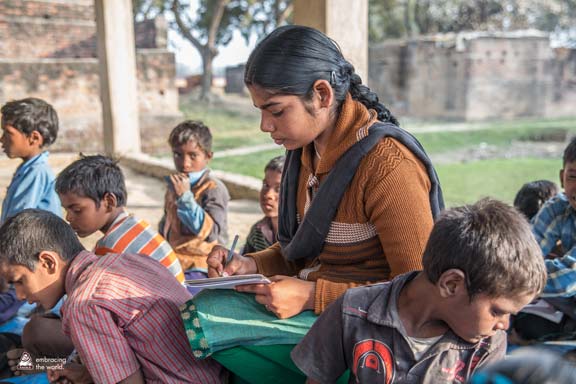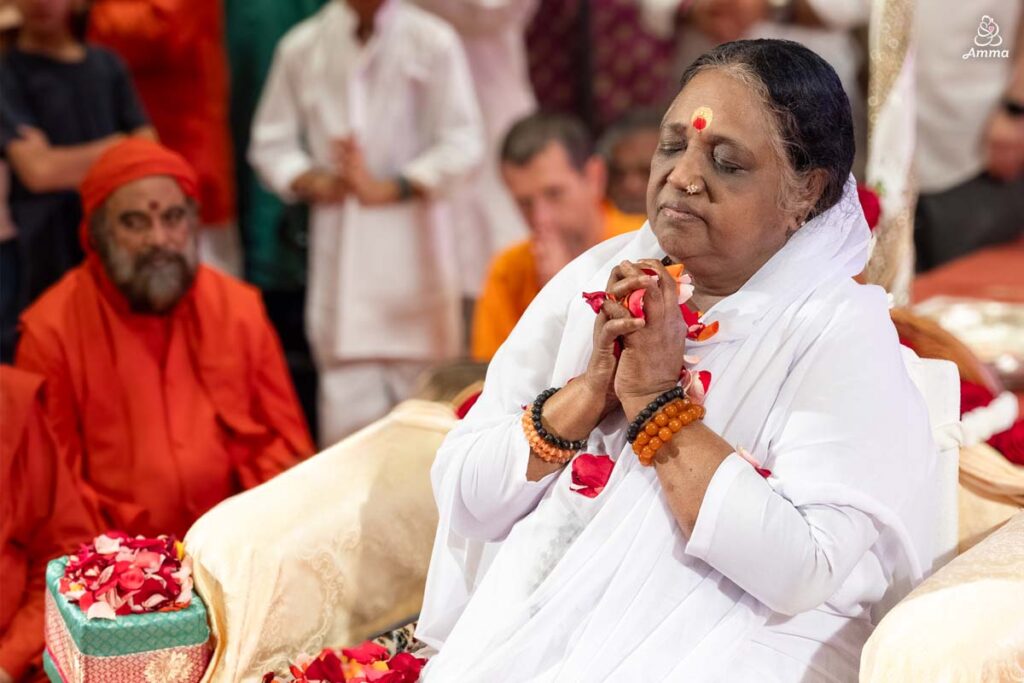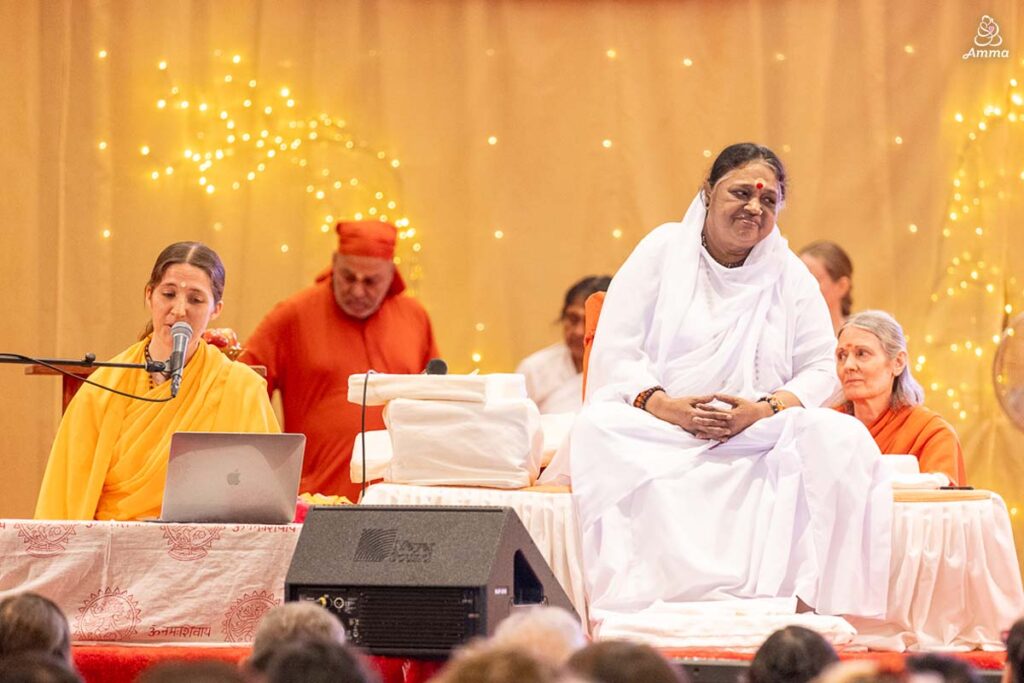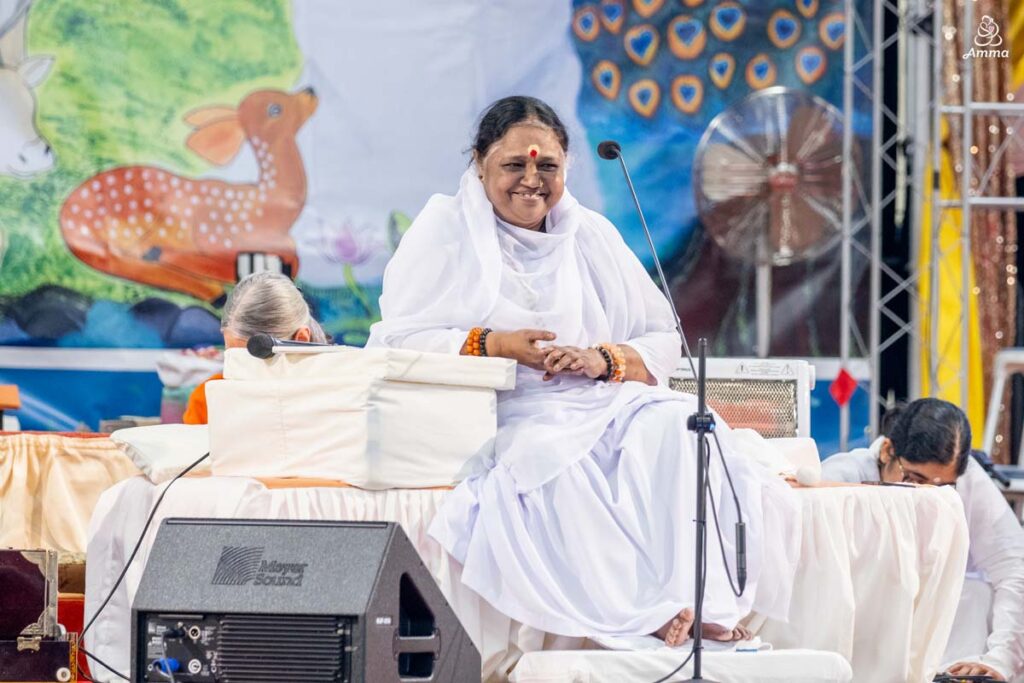Choti Kumari Singh, a 20-year-old staff member of our Amrita SeRVe Self Reliant Village programme, has won the “Women’s Creativity in Rural Life Award” from the Switzerland-based Women’s World Summit Foundation for her efforts in uplifting the Musahar community, considered the lowest and most downtrodden in the state’s caste-ridden social system.
Being from an upper-caste Rajput family, and struggling to make ends meet, Choti started helping with social and educational work among Musahars in her own village of Ratanpur in 2014, after joining Amrita SeRVe. Commenting on the award, Choti shared, “I am overjoyed and feel honoured to receive this global recognition for my work to empower one of the most deprived and depressed communities of India. I am grateful to Amma and the entire Amrita family. This achievement would not have been possible without the support of Amma’s Ashram and the Amrita SeRVe program.”
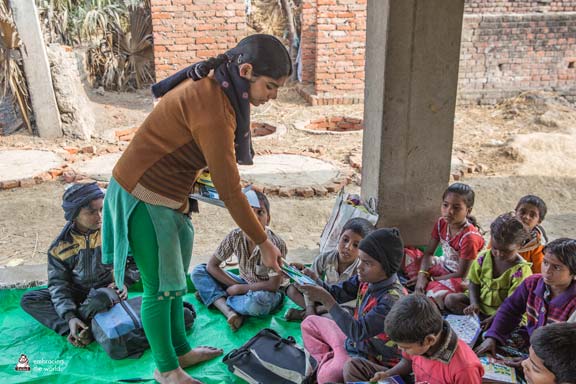
Added Swami Jnanamritananda, head of the Amrita SeRVe project: “We are extremely proud of Choti for winning this award. Amma started the Amrita SeRVe programme four years ago to help villagers uplift themselves, and Choti is the perfect example of that seed planted by Amma bearing fruit. Choti has shown great courage and dedication in working with the marginalized sections of society. Despite belonging to the higher Rajput caste, she had no reservations in mingling with the downtrodden Musahars to empower them socially and economically.”
Choti is the youngest person to receive the $1,000 USD [Rs. 83,000] award since it was instituted in 1994 to honour women around the world exhibiting exceptional creativity, courage and commitment for the improvement of quality of life in rural communities.
Mostly working as landless labourers, the Musahar community suffers from poverty, near-total illiteracy and lack of personal hygiene. Child marriages are rampant and school attendance is negligible. When the Amrita SeRVe program was introduced at Ratnapur in 2014, Choti jumped at the chance to be able to do something for the community. She started offering free after-school tuition classes for children in 2014. Said Choti: “It was a herculean task to bring Musahar children to the classes because their parents did not show slightest interest in educating them. I went door to door gathering children and trying to convince the parents. The children smelled very bad, as personal hygiene was non-existent. We began taking them to the nearby river to bathe them daily. Slowly, they started acquiring new habits.”
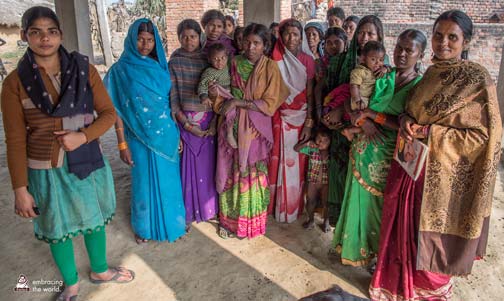
With the support of the Amrita SeRVe program, Choti started self-help groups where every woman saves 20 rupees a month, which are deposited in a common bank account for starting home-based activities. All pregnant women are now taken to the Primary Health Care centre, and mothers educated about their child’s vaccination schedule.
The tuition classes have proven a huge success, with 108 children enrolled in a village of less than 1,000 people. Attitudes toward education generally have been completely transformed by Choti’s efforts. “Initially, the Musahar villagers were hostile. They used to drink, gamble and verbally abuse me. My family was skeptical too. However, once they started observing the positive changes brought by our work, the situation became favourable,” said Choti.
At her tuition centre, Choti began offering basic lessons on hygiene and cleanliness. At first, the children were reluctant to remain clean and habitually took a bath only once in two weeks. “I had a tough time making them sit through the classes. Some of them even came to the class drunk! But with time, their attitude changed. I taught them the consequences of being disrespectful to elders, of not being educated and of alcohol addiction. Gradually, children who used to talk in foul language started using respectful greetings and became serious about studies and personal hygiene. I am sure many of them will go on to attend college.”
Going to college is a dream that, unfortunately, Choti couldn’t fulfill for herself. “I have two sisters and a brother. I also need to help take care of my mother. Though I got admission to a college, I couldn’t pursue my studies due to financial challenges. That is when I got introduced to Mata Amritanandamayi Math’s village-empowerment programme starting in my village. It was a good opportunity for me to shoulder some responsibility, gain experience and uplift the people of my village. Now, I feel what I am doing is the most important thing in my life.”
Seeing the devastating effects of the caste system at close quarters in her village, Choti believes the solution is to stress the universal brotherhood of humanity. “There should be no discrimination based on caste or religion or any other birth-based criteria. To remove social injustice, the youth must act as change agents to positively impact not only the community around them, but the entire nation.”
Choti’s efforts are part of a larger effort to help the Bihar villages of Ratanpur and Hadiabad, and 101 villages nationwide, become self-reliant and sustainable. In Ratanpur and Hadiabad, we started offering tuition classes in 2014, with students also participating in regular yoga and meditation sessions. Free healthcare is being provided in these villages, and an Amrita SeRVe trained health-worker is ensuring that all pregnant women get the required ante-natal care and that all newborn children are vaccinated. We have installed hand pumps in the villages to provide access to clean drinking water and helped women construct toilets. Consequently, the two villages of Ratanpur and Hadiabad have been verified and declared as Open Defecation Free by the Government’s Swacch Bharat Abhiyan program. Hadiabad, in fact, became the first village in the entire Bhojpur District to gain this status.
WWSF Prize for Women’s Creativity in Rural Life
Awarded since 1994 by WWSF Women’s World Summit Foundation – an international, non-profit, humanitarian NGO, serving the implementation of women and children’s rights and the UN development agenda – the Prize (US$ 1000 per laureate) honours women and women’s groups around the world exhibiting exceptional creativity, courage and commitment for the improvement of the quality of life in rural communities (413 prizes awarded so far). WWSF has enjoyed UN special consultative status with ECOSOC (since 1995).
The Prize aims to draw international attention to laureates’ contributions to sustainable development, food security and peace, thus generating recognition and support for their initiatives and projects. Rural women still do not have full access to tools needed for development, such as education, credit, land rights and participation in decision making. By highlighting and awarding creative development leaders and their work, innovations and experiences enhancing the quality of rural life, WWSF participates in empowering rural women in their contribution to end rural poverty, improve gender equality, and advance women’s rights.
For more information: http://www.woman.ch/index.php/en/


